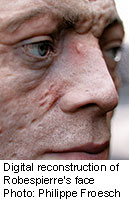- 8 Ways to Increase Dopamine Naturally
- 7 Best Breads for Maintaining Stable Blood Sugar
- Gelatin vs. Collagen: Which is Best for Skin, Nails, and Joints?
- The Long-Term Effects of Daily Turmeric Supplements on Liver Health
- Could Your Grocery Store Meat Be Causing Recurring UTIs?
- Are You Making This Expensive Thermostat Error This Winter?
- Recognizing the Signs of Hypothyroidism
- 10 Strategies to Overcome Insomnia
- Could Artificial Sweeteners Be Aging the Brain Faster?
- Techniques for Soothing Your Nervous System
French Revolution Leader May Have Had Immune-System Disorder


A leader of the French Revolution might have suffered from a rare immune system disorder in which the body starts to attack its own tissues and organs.
Researchers created a facial reconstruction of Maximilien de Robespierre, using the face mask made by Madame Tussaud after he was executed at the guillotine in 1794. They also reviewed historical documents on his medical history.
This led them to conclude that Robespierre had sarcoidosis, which causes small areas of inflammation in the body’s tissues. The condition, which most commonly affects the lungs, skin and lymph nodes, often causes tiredness and a feeling of being unwell.
“We do not know which treatment was given by his personal physician, Dr. Joseph Souberbielle, but fruits might have been included (in view of his very high consumption of oranges) along with baths and bloodletting,” the researchers wrote in the study, which was published in the Dec. 20 issue of the journal The Lancet.
The researchers, forensic scientists Philippe Charlier and Philippe Froesch, said the historical documents included witness descriptions of several clinical signs of sarcoidosis in Robespierre. These included vision problems, nosebleeds, jaundice, tiredness, leg ulcers, facial skin disease, and eye and mouth twitching. The symptoms worsened between 1790 and 1794.
Charlier and Froesch also said other possible explanations for some of Robespierre’s symptoms — such as tuberculosis or leprosy — do not fit exactly with his symptoms or the progression of his condition.
The causes of sarcoidosis are not well understood, but in many cases it goes into remission without treatment.
More information
The American Academy of Family Physicians has more about sarcoidosis.
Source: HealthDay
Copyright © 2026 HealthDay. All rights reserved.










